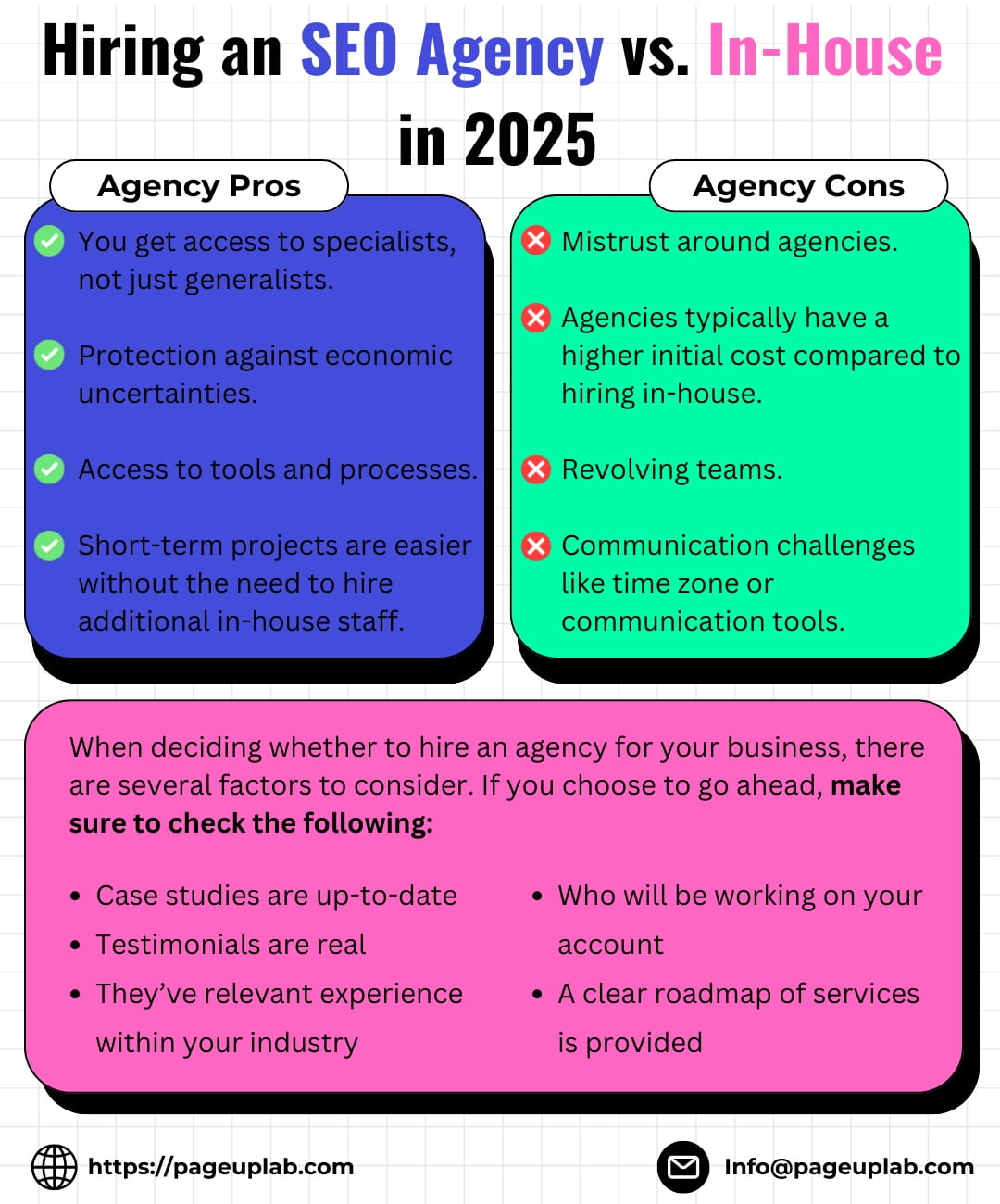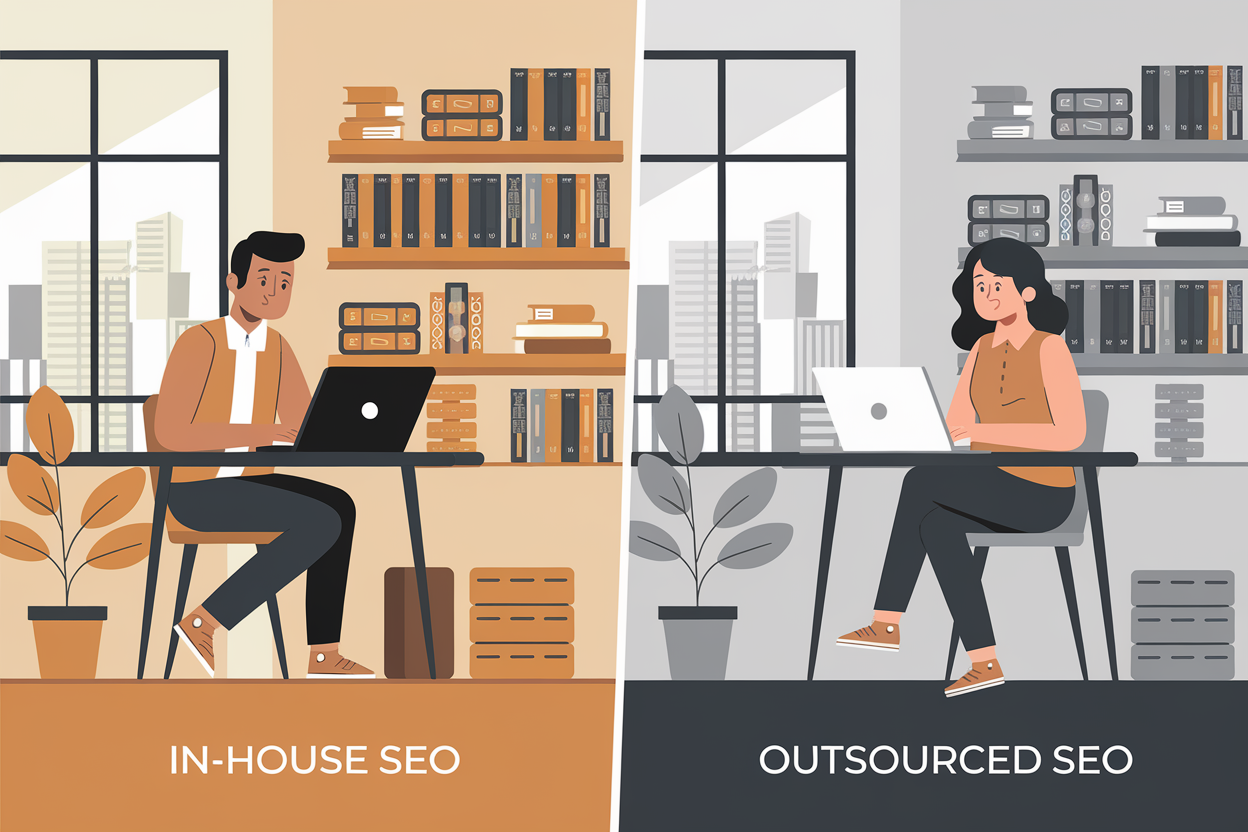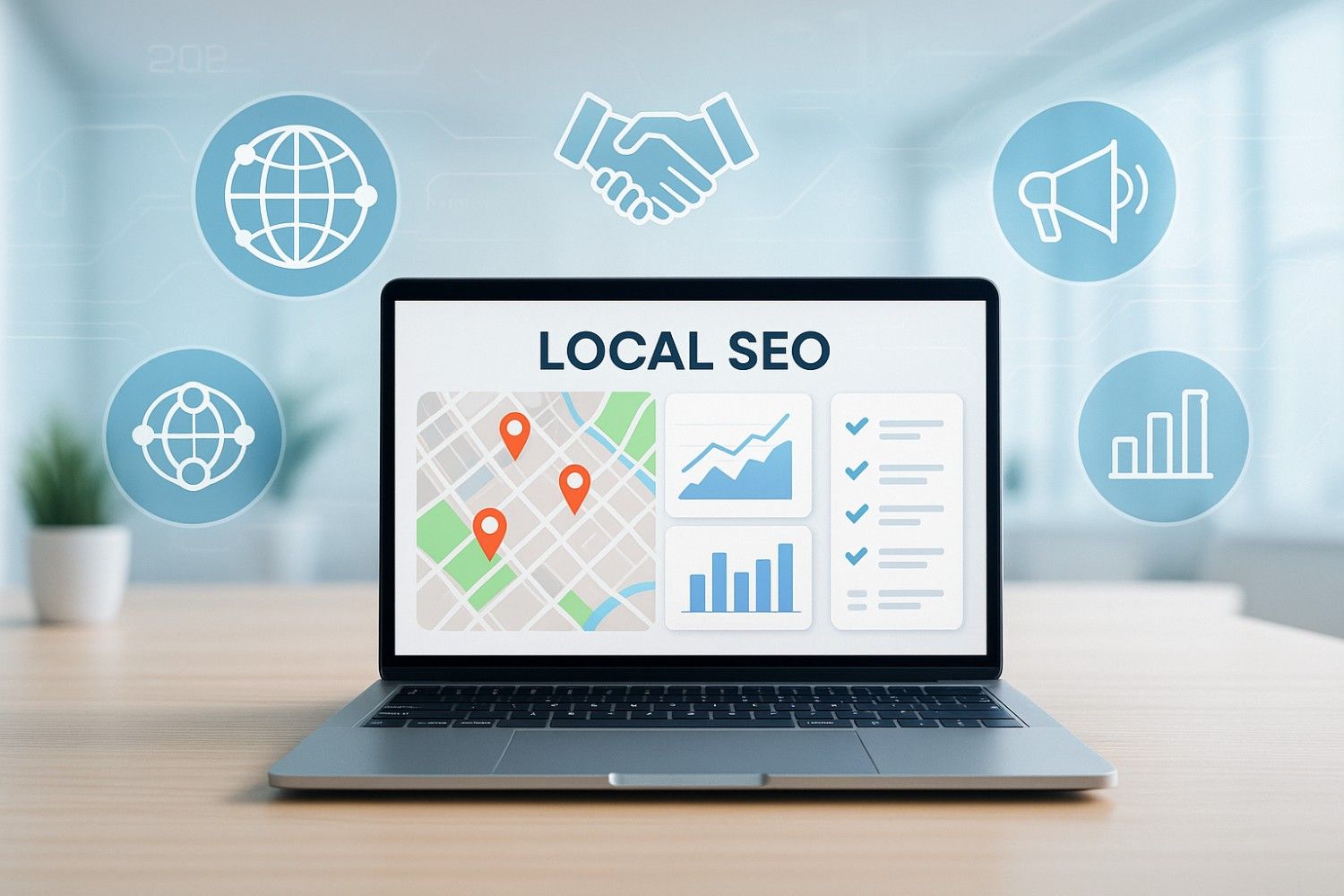With digital marketing more competitive than ever, a solid SEO strategy is crucial for success. However, when it comes to implementation, companies face a choice: should they build an in-house SEO team or hire an external agency? In this article, we’ll compare the benefits, drawbacks, and costs of in-house SEO and outsourcing, offering a framework to help you make the best choice for your business.
Understanding In-House SEO
Definition: In-house SEO involves hiring dedicated employees within your organization to handle all SEO activities. This team works exclusively for your brand, providing a high degree of alignment with company goals and direct communication.
Pros of In-House SEO:
- Brand Familiarity: An in-house team is often deeply familiar with your brand’s values, voice, and goals.
- Direct Communication: Team members can collaborate easily across departments, ensuring that SEO efforts align with broader marketing strategies.
- Long-Term Focus: With in-house employees, you can develop a long-term, customized SEO strategy, adapting as your business grows.
Cons of In-House SEO:
- Higher Costs: Salaries, training, and SEO tools can quickly add up. For smaller companies, in-house SEO may not be financially viable.
- Limited Expertise: Building a well-rounded in-house SEO team with experts in every SEO area (technical, content, link-building) can be challenging.
- Scalability Issues: Rapid scaling can be difficult; hiring and training new team members is time-consuming and expensive.
Key Data: According to a 2023 survey by Search Engine Journal, over 60% of companies reported challenges in hiring skilled in-house SEO professionals, with many citing high turnover rates and high salary demands.

Understanding Outsourced SEO
Definition: Outsourced SEO involves hiring an external agency or consultant to handle your SEO needs. Agencies often have specialized teams, including content creators, link-building experts, and technical SEO specialists.
Pros of Outsourced SEO:
- Access to Expertise: Agencies have experienced professionals specializing in various aspects of SEO, offering broad industry knowledge and skills.
- Cost-Effectiveness: For many businesses, outsourcing can be more affordable, avoiding the high costs associated with full-time, in-house employees.
- Scalability and Flexibility: Agencies can adjust their services based on your needs, making it easier to scale up or down based on your goals.
Cons of Outsourced SEO:
- Communication Challenges: Communicating your brand’s unique values and goals can sometimes be challenging with an external agency.
- Dependence on Contracts: Some agencies may require long-term contracts, limiting flexibility if your needs change.
- Potential Brand Disconnect: External teams may lack intimate brand familiarity, leading to less personalized strategies.
Key Data: According to a report by HubSpot, businesses that outsourced SEO saved an average of 30% compared to those with in-house teams, largely due to lower personnel and training costs.
Cost Analysis: In-House vs. Outsourced SEO
| Expense | In-House SEO | Outsourced SEO |
|---|---|---|
| Personnel | Salaries, benefits, recruitment costs | Agency fees, often monthly |
| Tools & Software | Full-cost of SEO tools like Ahrefs | Typically included in agency fee |
| Training & Development | Regular training, workshops | No additional cost for client |
| Total Estimated Cost | $60,000 – $150,000 per year (team) | $2,000 – $10,000 per month (agency) |
Example Comparison: A small e-commerce company with a modest budget may find an outsourced SEO option for $3,000 monthly more affordable than a $120,000 annual cost of an in-house team. Meanwhile, a larger corporation may benefit from the long-term strategic control of an in-house team despite the higher investment.
Quality and Expertise
In-House SEO
- Strengths: Having a team that understands your brand in-depth can yield highly tailored strategies.
- Challenges: It’s challenging for smaller in-house teams to stay updated on every SEO niche, from technical SEO to content marketing.
Outsourced SEO
- Strengths: Agencies have diverse specialists, making it easy to access deep expertise across various SEO disciplines.
- Challenges: Agencies may lack the same level of personalization as in-house teams since they’re serving multiple clients.
Case Study: A mid-sized retailer saw a 30% organic traffic increase within six months after switching to an SEO agency with deep e-commerce expertise. This growth was achieved by leveraging the agency’s team of technical and content SEO experts, which the company’s small in-house team couldn’t match.
Flexibility and Scalability
In-House SEO
- Challenges with Scaling: Hiring new team members can take weeks or months, hindering the ability to scale quickly in response to changing demands.
Outsourced SEO
- Ease of Scaling: Agencies are equipped to adjust their services based on a client’s evolving needs. You can easily scale services up or down with most SEO agencies.
Key Points: If you anticipate rapid growth, an agency’s ability to scale quickly may outweigh the control benefits of an in-house team.
Which Option Is Best for Your Business?
- Small Businesses and Startups: Outsourcing can be a more affordable way to access professional SEO services without breaking the bank.
- Medium to Large Businesses: Larger companies may find an in-house SEO team worthwhile, providing more control and alignment with overall business strategy.
- Hybrid Approach: For businesses seeking flexibility and expertise, a hybrid model can work well. An in-house team can handle day-to-day SEO, with an agency managing specialized tasks like technical audits.
Key Considerations for Decision-Making
- Budget: Assess your budget realistically. If an in-house team is too costly, outsourcing might be the right choice.
- SEO Goals: Define what you hope to achieve with SEO and choose the option that aligns best with these goals.
- Timeline: For rapid results, outsourcing can often deliver faster due to existing agency resources.
Conclusion
Choosing between in-house SEO and outsourcing depends on your unique business needs, budget, and SEO goals. Many small businesses find success in outsourcing, while large corporations may benefit from the control of an in-house team. Evaluating your current and future needs can help guide you toward the right decision.
FAQ’s
What is the main difference between in-house and outsourced SEO?
In-house SEO is managed by employees within your company, while outsourced SEO is managed by an external agency or consultant.
Is in-house SEO better for brand alignment?
Yes, an in-house team can often provide better alignment with brand goals, though outsourcing can work with clear communication.
How much does it typically cost to outsource SEO?
Outsourcing costs vary widely but generally range from $2,000 to $10,000 per month.
Can small businesses afford in-house SEO?
In-house SEO can be costly, making outsourcing a popular option for small businesses with limited budgets.
What are the risks of outsourcing SEO?
Risks include potential brand misalignment and dependence on external contracts.
Can a business combine in-house and outsourced SEO
Yes, many businesses use a hybrid approach to balance control and expertise.




